#H ZETT M
Text

透明ガール。
#toumei girl and toumei boy are my ayano and shintaro songs#they match toumei answer too JSNWJDH#art#digital art#fanart#kagerou project#kagepro#ayano tateyama#shintaro kisaragi#Spotify
140 notes
·
View notes
Text
This group is my newest obsession. Tokyo Calling?!? Nainainai?!?! Koi Geba?!?! 🤌🏾✨ Woo! Go! is sooo good too
1 note
·
View note
Text
Het ontmoeten van een vreemde
Aan de westgrens van het oude China houdt een poortwachter een oude man tegen. Hij begrijpt dat de man een wijze is die uit teleurstelling niet gehoord te worden zijn land wil verlaten. De poortwachter haalt hem over om zijn ideeën op papier te zetten, voor ze verloren zullen raken. Aldus, zegt de legende, zette Lao Zi zich neer en schreef wat later de Tao Te King zou heten, een boek dat tweeduizend jaar later nog gelezen wordt. Een toevallige ontmoeting die zijn schaduw eindeloos ver vooruit wierp.
Iedereen heeft toevallige ontmoetingen, en niet zelden vinden ze een vaste plek in het geheugen als zo'n ontmoeting met een vreemde leidt tot een gesprek, soms zelfs zonder dat. Ik herinner me de Letse kunstenaar Leonards Laganovskis met wie ik een slaapcoupé deelde in de trein van Berlijn naar Riga, de naamloze Braziliaanse vrouw in de trein van Parijs naar Amsterdam, de tweedehandsboek-handelaar Bill Smith in Edinburgh, die me later boeken als cadeaus stuurde, de volkomen onverwachte ontmoeting met de opgebaarde vrouw in een lege St. Nicholas Church op het eiland Tresco.
Vriendin en galeriehouder M vroeg me of ik een mij onbekende jonge Chinese kunstenaar wilde ontvangen, gewoon voor een gesprek. Ik zei onmiddellijk ja en vroeg hem, via haar: een tekstfragment mee te nemen, een beeld (beide niet van hemzelf) en een object. Ik besloot niet zijn website te bezoeken maar de ontmoeting open tegemoet te treden. H.Z. verscheen, een elegante jongeman met lang zwart haar en een bril. Hij keek nieuwsgierig en afwachtend toen hij binnenkwam en overhandigde mij een emmertje met blauwe bessen, een geschenk dat ik zeer waardeerde. Drie uren zouden we praten, hij vooral. Het viel mij onmiddellijk op hoe rijk zijn Engels was. Zijn zware accent maakte dat ik nog aandachtiger luisterde. Zijn grootouders waren boeren, zijn ouders hadden weinig scholing gehad. De transormatie die hij doormaakte, binnen luttele jaren, is enorm. Hij stuurde zijn ouders een video van zijn allereerste performance ooit. Voor even konden zij een blik werpen in de onbereikbare wereld van hun zoon. Hun reacties waren zowel aandoenlijk als ontroerend. Zelfverwezenlijking vraagt nu eenmaal een hoge prijs, kunstenaar worden een nog hogere.
H. koos het beroemde schilderij met het bruidspaar van Chagall, zwevend hoog boven een dorpje. Het object was een gekregen klein hart van ongebakken klei met een gat erin. Ik kon aan het einde van ons gesprek die twee dingen niet anders zien dan de uitdrukking van een verlangen naar verbinding, misschien ook liefde. Voeg daarbij nog een strofe uit een gedicht van Wisława Szymborska dat hij in een Engelstalig boek over Nan Goldin vond:
…. The little soul roams among those landscapes, / dissappears, returns, draws near, moves away, / evasive and a stranger to itself, / now sure, now uncertain of its own existence, / whereas the body is and is and is / and has nowhere to go.
Na afloop bedankte hij mij voor onze ontmoeting, en ik bedankte hem.
3 notes
·
View notes
Text
[ENG TRANSLATION] 透明ガール (新しい学校のリーダーズ)
Song Title Romaji: toumei girl
English Title: Transparent Girl
Artist: ATARASHII GAKKO!
Eighth track of the album "maenarawanai," listed on Spotify as toumeigirl(H ZETT M edit ver.).
Amateur translation. Feel free to send corrections.
requested by anonymous on this blog right here. i'm not active on there anymore, but i can't resist a good translation request, and i still do like ATARASHII GAKKO! so, here ya go! it isn't required either, since i did offer, but if you'd like, you can drop a ko-fi my way and send more requests!!
ORIGINAL JAPANESE/KANJI
言薬にしよう。したいことも、
言いたいことも全部言おうよ。
思いはどう伝えたらいいの?
うまく出来そうにない。。。
君に届くかな?
孤独な僕の夢を
知って欲しいよ。
見えなくてもいい
名前を呼んで。
今は色のない「透明girl」
あの子は友達思いでいいなあ。
周りはいつでも笑顔があって
その日は突然やって来た。
みんなの目から
僕は見えなくなった。
教室の窓から見た空
言薬にしよう。したいことも、
言いたいことも全部言おうよ。
思いはどう伝えたらいいの?
うまく出来そうにない。。。
君に届くかな?
孤独な僕の夢を
知って欲しいよ。
見えなくてもいい
名前を呼んで。
今は色のない「透明girl」
密かに気になるよ。
彼の横顔が、
話しかけてもいい?
いま目があえば…
優柔不断なの。
ヤバいどうしよう?
空気を読めれば
僕にも色がつくの?
言薬にしよう。
好きを声にして
このままじゃ嫌。
不透明な今 変わるよ。
僕らしく君を呼ぶ
だからそう。気付いてね。
少し不安もあるけど
欲しがることに怖がらないで
誰にも見えなくてもいいの
君だけに見てほしい
「透明LOVE」
ROMAJI
kotoba ni shiyou. shitai koto mo,
iitai koto mo zenbu iou yo.
omoi wa dou tsutaetaraii no?
umaku dekisouninai...
kimi ni todoku ka na?
kodoku na boku no yume wo
shittehoshii yo.
mienakutemoii
namae wo yonde
ima wa iro no nai "toumei gaaru"
ano ko wa tomodachi omoi de ii na
mawari wa itsudemo egao ga atte
sono hi wa totsuzen yattekita
minna no me kara
boku wa mienakunatta
kyoushitsu no mado kara mita sora
kotoba ni shiyou. shitai koto mo,
iitai koto mo zenbu iou yo.
omoi wa dou tsutaetaraii no?
umaku dekisouninai...
kimi ni todoku ka na?
kodoku na boku no yume wo
shittehoshii yo.
mienakutemoii
namae wo yonde
ima wa iro no nai "toumei gaaru"
hisoka ni ki ni naru yo
kare no yokogao ga
hanashikaketemoii?
ima me ga aeba...
yuujuufudan na no
yabai dou shiyou?
kuuki wo yomereba
boku ni mo iro ga tsuku no?
kotoba ni shiyou
suki wo koe ni shite
kono mama ja iya
futoumei na ima kawaru yo
boku rashiku kimi wo yobu
dakara sou. kizuite ne
sukoshi fuan mo aru kedo
hoshigaru koto ni kowagaranaide
dare ni mo mienakutemoii
kimi dake ni mitehoshii
"toumei LOVE"
ENGLISH
Let’s put it into words
Let’s talk about what we want to do and say
How can I communicate my thoughts?
I don’t think I’ll be able to do it well…
Will they reach you?
I want you to know of my lonely self’s dreams
It’s fine even if you can’t see me
Call my name
Now I am a colorless transparent girl
That guy is considerate of his friends, and that's good
Around us there were always smiles
That day came suddenly
I disappeared before everyone’s eyes
The sky I watched from the classroom window
Let’s put it into words
Let’s talk about what we want to do and say
How can I communicate my thoughts?
I don’t think I’ll be able to do it well…
Will they reach you?
I want you to know of my lonely self’s dreams
It’s fine even if you can’t see me
Call my name
Now I am a colorless transparent girl
Secretly, it caught my eye
His face in profile
Is it all right to strike up conversation?
If our eyes meet…
I’m indecisive
Crap, what do I do?
If I can read the mood,
will my color change too?
Let’s put it into words
Let’s verbalize our infatuation
I don’t want to stay the way I am
This opaque present will change
I will call you, like I am wont to do
So yes, please notice
I’m a little bit anxious
but don’t fear the things you want
It’s fine if no one can see me
I want only you to look at me
"Transparent LOVE"
---
SOME THOUGHTS
i love this song but i honestly wish it meant something else haha not a fan of these types of love songs. the title is so interesting too. i actually initially translated it as "invisible" because 透明人間 (toumei ningen) means "invisible person," but transparent is more literal and true to the definition, so i went with it. besides, the persona talks about changing color, so that implies they can't be completely invisible
i'mma keep it real with you chief: atarashii gakko! songs are usually difficult to translate because they use so many terms that are either slang of the japanese Gen Zs or just words that can't be found in my go-to dictionary. i actually had to ask native speakers what they thought of the meaning for some lines, particularly the 友達思い one. i initially thought that でいい meant "it's fine" but it's actually a usage of the で that connects nouns and adjectives and also indicates reason. that was confusing af
another thing i took note of was the use of 気になる (ki ni naru), which can either mean 'to bother' or 'to be interested (in).' i went with the latter because this IS a love song and the persona is talking about the guy's face (and yes, unfortunately, they are singing to a guy, as made known by 彼) so it made more sense. special shoutout to the line "少し不安もあるけど欲しがることに怖がらないで," because that shit's so real it hurts. even if it is just talking about something as simple as a confession
#ro translates#amateur translation#lyrics translation#atarashii gakko!#atarashii gakkou no leaders#toumei girl#japanese translation
2 notes
·
View notes
Text
I love this song!!!
I love AG!!!
I really want to hear this song live someday..
0 notes
Text
2024.3.22(fri) Transient Happiness@浦和KUNI HOUSE

POW's DJ setlist (30min)
01.YA YA / DOPING PANDA
02.NAYUTANIZED / avengers in sci-fi
03.LOST SHEPHERD / ASPARAGUS
04.Dances / Ykiki Beat
05.Sunday / TOKYO No.1 SOUL SET + 土岐麻子
06.GALAXY / BOOGIE MATSUDA & FUNKY★FREAKS
07.いけないダンス / ゲスの極み乙女。
08.SPY / 一青窈 Feat. SOIL&"PIMP"SESSIONS
09.正気じゃいられない / マハラージャン
10.真夜中は純潔 / 椎名林檎
11.透明ガール (H ZETT M edit ver.) / 新しい学校のリーダーズ
12.キャッチミー岡っ引きさん / レキシ Feat. もち政宗
13.oh yeah!! / Shiggy Jr.
14.chain smoker / FRONTIER BACKYARD
15.半透明少女関係 / ZAZEN BOYS
16.悶々 / Cody・Lee (李)
17.シュラバ★ラ★バンバ / バックドロップシンデレラ
18.独壇場Beauty -R.I.P.- / BUCK-TICK
19.愛なき世界 (Cisco Rock Remix) / くるり
20.Puppy Love (Body Movin' mix) / Perfume
21.銀河 / フジファブリック
0 notes
Text
Kort bibberen voor Frankrijk: 4-1
Australië zette even de boel op stelten met een vroege 0-1. Maar nog voor de rust waren de rollen omgekeerd. Uiteindelijk sloot Frankrijk de wedstrijd af met 4-1 winst.
Maar liefst 5 doelpunten in deze match. Een uitstekende goaltjesmatch keuze van Bram V.. Hij dikt zijn puntentotaal aan met maar liefst 10 punten.
Helaas voor Charlotte F. kwam Griezmann niet tot scoren. Mbappé deed dat wel. Zijn doelpunt levert Bart C., Bjorn P., Bram V., Evi D., Hans B., Jago M., Jef C., Jeff W., Maurice C., Tom V., Wouter S., twee topschutterpunten op.
Goaltjeskeeper Frankrijk slikte ook één tegendoelpunt wat resulteert in één minpunt voor Jago M., Michiel P. en Tim H.
In de matchprono een 4-1 voorspellen? Jawel, Evi D. deed het. Zij gaat met 3 punten aan de haal. Winst voor Frankrijk werd door 38 andere deelnemers genoteerd (elk 1 punt). Christof C., Kasper D. en Steven M. blijven bij deze uitslag puntenloos achter.
De tussenstand kent een nieuwe leider. Bram V. vertaalt zijn uitstekende prestatie naar een eerste plaats met maar liefst 4 punten voorsprong. Evi D. komt postvatten in de top 3. Hans B., Jens B., Christian P., Jeff W., Gert P., Jarno F., Bart C., Christof C., Paul E., Jef C., Bjorn P., Luther H., Tom V., Maurice C., Seppe V., Jago M. zijn de andere stijgers in de tussenstand.
Klik hier voor een grotere afbeelding.

0 notes
Photo

🆕 「New Thing」 by H ZETT M
💿 from 「記憶の至福の中に漂う音楽」 now available overseas!
Listen to it on Spotify 🎧 https://open.spotify.com/track/4yV4cNjLs3Q6fHYmwglrEF
#JPOP
1 note
·
View note
Video
youtube
Sheena Ringo & Hikaru Utada- The Sun & Moon
4 notes
·
View notes
Audio
I don't know if I've ever shared these guys before, but please give them a listen
2 notes
·
View notes
Video
youtube
atarashii gakkou no leaders — koi no shadanki feat. h zettrio
#atarashii gakkou no leaders#新しい学校のリーダーズ#atarashii gakkou#h zettrio#music#jpop#h zett m composing for a girl group isn't anything i would expect but it's good
10 notes
·
View notes
Text
Interview with Natalie.mu [Jan 17,2022]


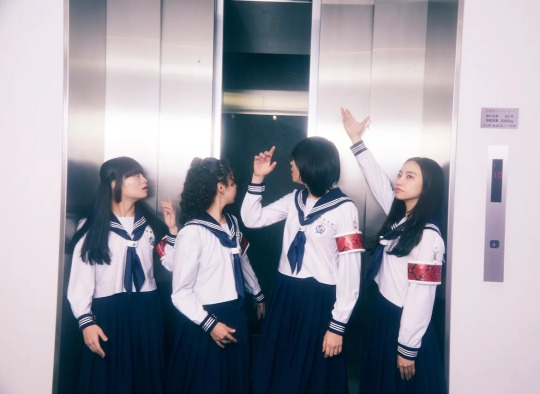
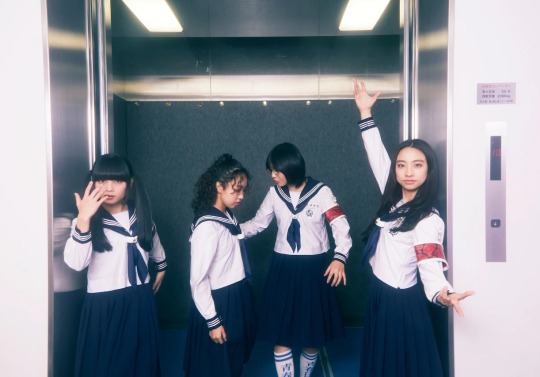
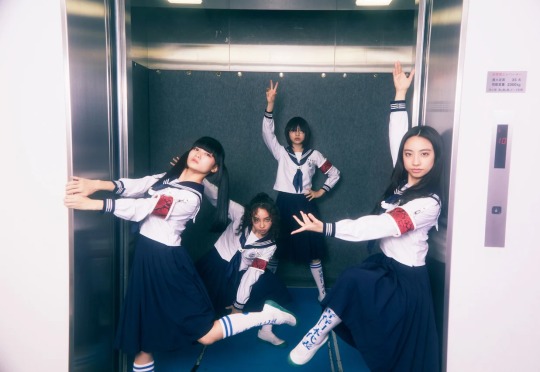
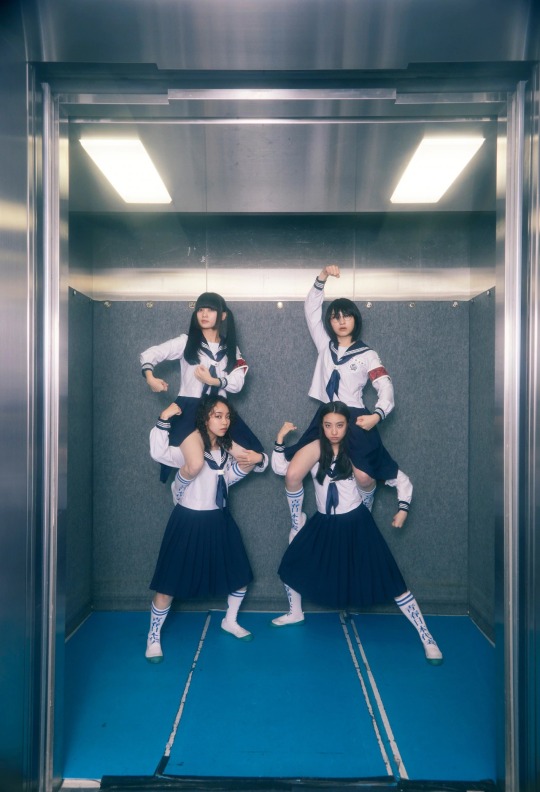
I remember AG! was trending on JP twitter the day this came out. This interview was trending 🥺. (+ Aa music performance on tv)
Part 1
SOME EXCERPTS
──I knew about the high performance of the leaders of the new school, but when you announced the contract with 88rising in November 2020, I was really surprised.
MIZYU: The story started in February 2020, and I met 88rising people online and shot the music video of the world debut song "NAINAINAI" in the summer.
♪¸¸.•*¨*•.
──The contract was triggered by the arrival of the performance video of "Koi Geba" (written by Temma Matsunaga and composed by H ZETT M, released in 2019) at 88rising.
MIZYU: Yes, that was taken at the end of January 2020, and the one who took it had a connection with 88rising.
SUZUKA: Please send the video to 88rising. That person will come to the two-man live "Men and Women Ratio One-to-Four" (held in February 2020) with Soshi Sakiyama, and at that time, said "I will take you overseas". When we heard that, we laughed with surprise, "Is it true ...! Eh!", And when asked "Can you speak English?" I was talking in English.
KANON: The video that triggered wasn't taken for the purpose of making an overseas debut, but when I worked on it I said "I'll do my best because it may lead to something from here", it led to an unexpected place.
SUZUKA: As the range of activities expanded, we had the feeling that "I can do something ...?" but! There was more talk than I had imagined, so I said "Wow ...!". I was impressed.
♪¸¸.•*¨*•.
──Did you have an image of overseas activities?
SUZUKA: Until now, I was researching how to cut into the Japanese music industry! However, the decision to make an overseas debut made me think, "I want to grow even more!
♪¸¸.•*¨*•.
──Did you originally know about 88rising?
EVERYONE: I didn't know
MIZYU: It was a feeling that the world expanded really suddenly. However, before that, there were opportunities to be seen by foreigners at TikTok, etc., and there may have been a part where I began to be conscious of "we want to be an artist who symbolizes Japan." That's why I came to call myself "Youth Japan National Team".
♪¸¸.•*¨*•.
──Of course, you also met Sean Miyashiro, the representative of 88rising.
MIZYU: At first, I met him through the online screen, but when I thought that Sean was in a place like a skyscraper, he suddenly moved and a dog came out, and I felt something different. When I watched the video of the program we interviewed, Sean in a fur coat also appeared. He had a great sense of a president, and I thought it was artistic and American, but when I first met him in person, he wore shorts and sandals, and it was very human and friendly
SUZUKA: His laughter was unique! Like "Awoo! Ah"
MIZYU: It was innocent and lovely (laughs)
♪¸¸.•*¨*•.
──88rising has a strong image of hip-hop, and it was often talked about who would be the contract for Japanese rappers, but since the contract for the leaders of the new school was announced, among hip-hop fans the shock was spreading in the meantime.
RIN: It is a very challenging place, but once I set foot there, I wanted to take on more challenges. Every time we release a song with a strong beat like "NAINAINAI" on 88rising or find a new side of ourselves, we are excited. Besides, I want to make 88rising more interesting from our own angle.
SUZUKA: When I look at 88rising's YouTube channel, I think, "We just have a different atmosphere ...?", But I was very happy to hear a lot of surprisingly good reactions. I was impressed again by saying, "Our style is wrong, NAINAINAI!"
♪¸¸.•*¨*•.
── Sean Miyashiro said in a past interview about the kind of artist you want to sign up for, "it needs to be different from existing artists," so I think it's correct.
MIZYU: Sean said, "I'm trying various songs, but I don't want to change the roots of the four people, I want to make the most of the wonderfulness of the four people." When the contract was decided, I was worried that "I wonder if I will sing only English from now on" or "I think it will change a lot", so "You guys can stay as you are!" I was very relieved by Sean's words. I was very happy to hear that you trusted us and made a contract. A person who expands our potential and gives us an opportunity to reach the world.
♪¸¸.•*¨*•.
──What did Sean particularly appreciate about the Leaders?
SUZUKA: After all it is the dance. Seeing the performance of "Koi Geba", which is fierce in our songs, it seems that he thought "Wow!" To the energy, and "I love" the video of "the night before the test"(Shiken Zenya).
RIN: He was enjoying the energy.
SUZUKA: I want to show more and more, not just energy.
♪¸¸.•*¨*•.
──How did you decide on your overseas name, "ATARASHII GAKKO!"?
SUZUKA: If the leaders of the new school were made into the alphabet as they were, it would be "ATARASHII GAKKO NO LEADERS", but I thought that "NO" would mean YES / NO. NO wasn't good, so I got a candidate for a completely different name, but when I looked up the group online, I wanted to connect with my activities so far. Then it became "ATARASHII GAKKO!"!
MIZYU: The exclamation mark was Sean's suggestion.
KANON: In overseas, we are abbreviated as "AG!", which is also cute. The result was very good.
10 notes
·
View notes
Text
's-Hertogenbosch, 9 januari 2022
Ha M,
Ooit verkeerden we voortdurend in elkaars gezelschap. Soms waren we erg close, vielen we zo'n beetje samen, maar veel vaker observeerde ik jou, en dacht er het mijne van. Weet je nog, je was elf, er werd geoefend in de gymzaal voor de schoolsportwedstrijden. Wie van de klas zou meedoen met de estafette voor meisjes? Ik, ik, meester!, riep je. Daar stonden jij en ik. Start! en weg was je! Opeens was daar de muur, waar je tegenaan kwakte. Ik zie je nog in je kamer liggen en dat de huisarts kwam kijken en zei dat je een hersenschudding had en vermoedelijk ook een gekneusde rib. Je hield van wilde dingen, van in bomen klimmen, slootjes springen, wild doen. Soms vocht je met jongens en lukte het er een onder je te krijgen, dan zette jij je knieën op zijn bovenarmen en eiste: meisjesgenade! Heerlijk, hoe onze lichamen deden wat we wilden.
Niet lang daarna was het andersom en deed jouw lichaam met jou wat het wou. Er werd je niets gevraagd. Er zat niets anders voor je op dan het gedwee en soms angstig te volgen. 'Ik dacht dat ze dood ging', bekende onze vriendin H mij bijna een halve eeuw later. Dat dacht jij toen nooit, wel keek je af en toe naar je lichaam, zo mager en met flinke littekens op je buik. Je borsten wilden maar niet groeien en je keek naar andere meisjes en bande alles uit wat met jongens te maken. Er begon van alles te woekeren in jou, weet ik.
Je wilt vast dat ik een stuk over sla. Ook goed hoor. Vast ook dat stuk waarin je te horen kreeg dat je nooit kinderen zal kunnen krijgen? Toen brak er een tijd aan dat jongens, mannen ondertussen, oog voor je kregen. Wat was je toen slank! Mooi zou ik niet zeggen, maar best aantrekkelijk. Als ik je in de spiegel zag kijken, zei je wel eens: een vrouw kleedt niet zichzelf, maar de vrouw die ze wil zijn.
Kijk ons beiden nu eens: jij en ik. Zoveel ouder en grijzer, ons beider lichaam legt opnieuw zijn wil aan ons op. We hebben er niets meer over te zeggen, lijkt het. Ik lijd eronder, maar jij, jij bent zo verschrikkelijk positief. “Wat is je geheim?', vroeg onlangs een van Nederlands bekendste schrijvers van dit moment aan jou. Je antwoordde: 'Ik volg alleen mijn natuur'. Hij bekende daar best jaloers op te zijn. Ik ben daar ook jaloers op, beken ik op mijn beurt.
Als we elkaar over een tijd weer eens tegenkomen, gewoon toevallig, op een onbewaakt ogenblik, vraag ik je om iets van die zogenaamde natuur van je op mij over te dragen. Ik weet niet hoe, maar ik vermoed dat jij precies weet hoe dat in zijn werking gaat.
Een groet,
M
4 notes
·
View notes
Text
"JEZEBEL" (1938) Review
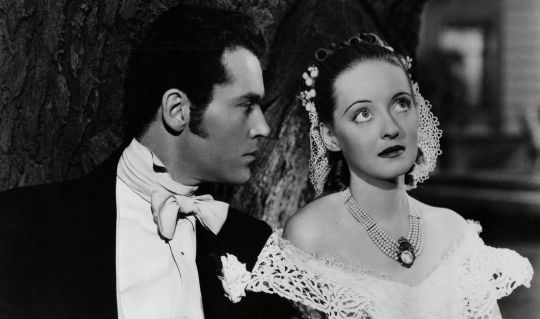
"JEZEBEL" (1938) Review
Following the release of Margaret Mitchell's 1936 novel, "Gone With the Wind", some Hollywood studios scrambled to find a way to cash in on its success. Producer David O. Selznick managed to purchase the film rights to Mitchell's novel. However, Warner Brothers Studios decided to do its own Southern melodrama called "JEZEBEL".
Directed by William Wyler, "JEZEBEL" starred Bette Davis in the title role as a headstrong New Orleans belle named Julie Marsden in the early 1850s. Julie's vanity and willful nature leads her to a series of actions, culminating in the loss of the man she loves, a banker named Preston "Pres" Dillard. The movie begins with Julie and Preston engaged and the former demanding the full attention of the latter. When Pres refuses to drop his work and accompany her on a shopping expedition for the upcoming Olympus Ball, Julie decides to retaliate by ordering a red dress (in New Orleans society, virgins wear white). Although Pres accompanies Julie to the ball and dances with her, he eventually has enough of her temperamental and foolhardy behavior and breaks off their engagement. Then he leaves New Orleans to spend some time up North in New York City. Julie eventually realizes she had made a major blunder and spends a year grieving over her broken engagement. However, she becomes determined to mend fences with him, when he returns to New Orleans. But their reunion proves to be bittersweet, due to Pres' new companion - his bride - and the potential danger of a yellow fever pandemic within the city.
The road to the 1938 movie began with playwright Owen Davis Jr., whose play of the same title made its Broadway debut in December 1933. Starring Miriam Hopkins, the play only ran on Broadway for over a month before it eventually flopped. Someone at Warner Brothers must have seen some kind of potential in this Southern melodrama for the studio had purchased the play back in 1937. Rumor has it that the studio had specifically purchased it for Bette Davis as compensation for her failure to win the part of Scarlett O'Hara for David O. Selznick's film adaptation of Mitchell's novel. The truth is that Selznick had yet to consider his leading lady for the 1939 film back in 1937. I think Warner Brothers saw the story provided a juicy role for Davis and purchased it. Miriam Hopkins, who had starred in the 1933 play, had hoped to be cast in the coveted role. Needless to say, she was very disappointed when Wallis informed her that he had only "considered her" for the role. Warner Brothers had originally cast Jeffrey Lynn for the role of Julie's true love, banker Preston Dillard. However, the producers of a play he was appearing in refused to release him and the studio eventually turned to 20th Century-Fox star Henry Fonda as a last minute replacement. As for the film's director, Wallis and studio chief Jack Warner's first choice as director was Edmund Goulding (who had directed "GRAND HOTEL"), who was eventually dropped. Next, they approached Michael Curtiz (future "CASABLANCA" director), who dropped out at the last moment. They finally hired William Wyler, who had a contract with Samuel Goldwyn at the time.
There have been many comparisons between "JEZEBEL" and the 1939 movie, "GONE WITH THE WIND". Considering the settings and leading female roles for both films, I could see why. But this is about my opinion of "JEZEBEL". The 1938 movie is not perfect. Since the film is set in the Antebellum South, naturally it would feature characters that are African-American slaves. With the exception of two characters, the majority of them are portrayed in the usual "happy slaves" literary trope that has marred a good number of Old Hollywood films set during the 19th century. You know . . . infantilizing the black characters. One scene featuring Julie's maid, Zette, enthusiastically accepting Julie's infamous red gown as a present. Now, any maid worth her salt would recognize the gown as trash. A black maidfrom the 1939 comedy, "DAY TIME WIFE", certainly regarded a cheap rabbit fur as trash and contemptuously rejected it as a throwaway present. But this wince-inducing portrayal of blacks in "JEZEBEL" seemed to be at its zenith in one particular scene that featured the Halcyon slaves greeting Julie's guests upon their arrival at her plantation . . . with cheers. Mind you, I have seen worse in the 1957 movie, "BAND OF ANGELS". Another major scene that I found equally wince-inducing featured Julie and a group of young slaves surrounding her, while they sing "Raise a Ruckus" to her guests. Yikes. I find ironic that a film like "GONE WITH THE WIND", which was equally guilty of its cliched portrayal of African-Americans, managed to feature at least three or four memorable black characters. I cannot say the same for "JEZEBEL", despite having the likes of Eddie Anderson (who was also in the 1939 Best Picture winner) and Theresa Harris in its cast. William Wyler redeemed himself, I am happy to say, in his 1956 movie, "FRIENDLY PERSUASION". Ironically, a good number of the white minor characters - namely men - seemed to be stuck in some kind of "Southern gentlemen" cliché from stories set in the Old South. You know the type - he wears a wide planter's hat, while either holding a glass of booze, a cigar or both; while discussing duels or putting down Yankees. This was especially apparent in one of the film's first scenes at a saloon, inside the famous St. Louis Hotel.
There is also one scene, earlier in the film, that left me scratching my head. It featured Preston Dillard at his bank's board meeting, discussing the possibility of constructing rail lines through New Orleans and throughout Louisiana. I realize that the other board members' negative reaction to Pres' support for the railroad was suppose to be a sign of the South's backwardness and unwillingness to accept the advancement of technology. But I found this hard to accept. The movie began in 1852. During this period, the state of Louisiana was already expanding the railroad throughout the state. Nor was the South adverse to accept technological advances, as long as its elite profit from it. If the region - especially the Mississippi Valley - was willing to use steamboats to ship their cotton and sugar to the North, why not railroads? One mode of transportation was just as good as the other. And Southern planters certainly had no qualms in using Eli Whitney's invention of the cotton gin to become the number one producer and exporter of cotton in the first place. So, this scene seemed a bit unreal to me from a historical point-of-view.
I have two other problems with "JEZEBEL" that I consider aesthetic. One of those problems featured the film's production designs, supervised by Robert Fellows. I had no problems with the production designs for New Orleans' French Quarter. I had a big problem with the production designs for Julie Marsden's plantation, Halcyon. At least the exterior designs. In the scene that featured the arrival of Julie's guests, Halcyon's front lawn and the exterior designs for the house resembled a large house in a Southern suburb, instead of a plantation house. I did not expect Halcyon's exteriors to resemble some clichéd Southern manor. But it seemed quite clear to me that Fellows, along with art director Robert M. Haas and the film's art department did not put much thought in the plantation's exterior design. Quite frankly, it almost resembled a facade constructed in front of a matte painting, on the Warner Brothers back lot.
I certainly did not have a problem with most of Orry-Kelly's costumes for the film. But I had a problem with one in particular . . . namely the infamous Olympus Ball "red gown":
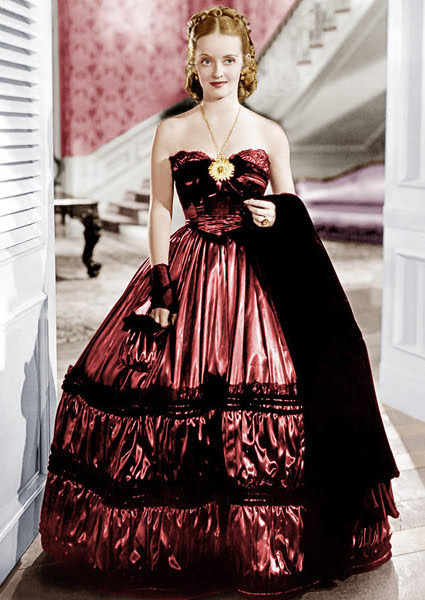
I realize that in the movie, the gown had been originally created for one of New Orleans' most infamous courtesans. And I did not have a problem with the gown's full skirt, which accurately reflected the movie's early 1850s setting. But that bodice . . . seriously? A strapless ballgown in 1852? I do not care if the gown was originally created for a prostitute. No such ballgown existed in the 1850s. The gown's bodice struck me as pure late 1930s. The ballgown is practically schizophrenic as far as historical accuracy is concerned. And I am surprised that so many film critics and movie fans have failed to realize this.
Surprisingly, there is a good deal to admire in "JEZEBEL" . . . actually a lot. Many critics have compared it unfavorably to "GONE WITH THE WIND", due to the latter being a historical drama. Somewhat. Well, aside from its use of the New Orleans 1853 Yellow Fever Epidemic and the U.S. sectional conflict of the antebellum period in its narrative, "JEZEBEL" is not what I would describe as a historical drama. Which is why I find the movie's comparison to "GONE WITH THE WIND" rather questionable. Besides, the movie is basically a character study of one Julie Marsden, an orphaned Louisiana belle who also happened to be the owner of a plantation called Halcyon. Screenwriters Clements Ripley, Abem Finkel and John Huston structured the film's narrative as a three-act play - which is not surprising considering its literary source. All three segments of the film - "The Dress", "The Duel" and "The Fever" - served as different stages in Julie's tenuous relationship with Pres Dillard. But the best I can say about "JEZEBEL" it is a well-balanced mixture of character study, melodrama and a touch of historical drama for good measure. I can honestly say that "JEZEBEL" was not some uneven mixture of genres.
There is something about "JEZEBEL" that I found rather odd. On one level, the whole movie seemed to be about how a willful and over-privileged woman finally received her comeuppance after causing so much chaos and even tragedy in the lives of those close to her. Yes, Julie Marsden was a selfish and rather childish woman who believed the worlds of others - especially Pres Dillard - should revolve around her. After all, it was her petulant reaction to Pres' refusal to accompany her on a shopping trip that set their break-up in motion. But I must admit that I was surprised to find some aspect of the film's narrative that questioned the 19th society that demanded Julie remained in her place, as a woman. Yes, she was selfish and childish. But she possessed a bold personality that seemed unfit for conforming to society's rigid rules. In a way, I could not help but wonder if some of her attempts to do what she wanted had sprung from some kind of frustration at being expected to remaining below the glass ceiling. Surprisingly, one example was the character Preston Dillard. As I had pointed out earlier, "JEZEBEL" featured the usual "happy slaves" clichés in its portrayal of the African-American characters. But it also used the Pres Dillard character to criticize the South's dependence on slavery. Pres denied more than once of being a follower of abolition. Yet, his criticism of slave labor, his respectful attitude toward slaves like Uncle Cato, his decision to live in the North and his support for technological advances in transportation and an improved sanitation system for New Orleans seemed to hint otherwise.
A better example of the film's criticism of 19th century Southern society came from the film's second act, "The Duel". Yes, I felt contempt at Julie's efforts to humiliate Pres and his new bride Amy by manipulating her former beau, the hot-headed Buck Cantrell, into goading them. And I also felt disgusted when her manipulations led to a duel between Buck and Pres' younger brother, Theodore "Ted" Dillard. This proved to be especially ironic due to the close friendship between the pair. But what really disgusted me was not only did Julie eventually realized she had went too far and tried to prevent the duel; both Buck and Ted knew that Julie had manipulated them into that duel and her reason behind her action. Yet, those two morons insisted upon carrying out the duel. For face. I was especially disgusted with Buck and his blind adherence to this "gentleman's honor" nonsense. Buck and Ted's insistence upon carrying out their duel, despite knowledge of Julie's role in it, seemed to be a harsh criticism of a society that encouraged such duels. This is pretty rare for a Hollywood film made before the 1960s, let alone the 1950s.
Despite a few quibbles, I was very impressed by the production and art designs for "JEZEBEL". Red ballgown aside, I thought Orry-Kelly did an exceptional job with the film's costumes. The Australian-born designer's costumes came very close to reflecting the fashions of the early 1850s - not only for women, but also for men. I was also impressed by the production and art designs that also did an excellent job of reflecting the film's setting - 1852-1853 Louisiana. The exterior designs for the Halcyon plantation may have been a bust, but I cannot say for the other exterior and set designs. This was certainly the case for the exterior designs for the New Orleans French Quarter scenes, as seen in the image below:
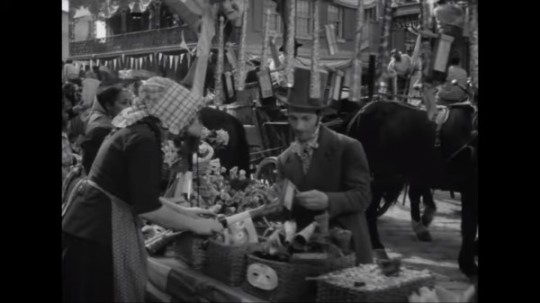
I simply found them exquisite. This artistry was on full display, thanks to the movie's long opening shot that introduced movie fans to New Orleans circa 1852. And we can thank both director William Wyler and cinematographer Ernest Haller for this memorable scene. And this was just the first. Another creative sequence from Wyler, Haller and the film's art designers featured a montage that introduced movie audiences to the film's third and final act - the Yellow Jack epidemic.
I did not have a problem with the film's performances. In general. But as I had stated earlier, I found some of the performances for minor white planters and black slaves a bit over-the-top. One of those over-the-top performances came from Donald Crisp, of all people, who portrayed Dr. Livingstone - Pres Dillard's mentor. I thought Crisp took the whole Southern gentleman cliche just a bit too far. I was also a bit troubled by Theresa Harris' portrayal of Julie's maid, Zette. It seemed a bit too cliched in my opinion and I wish that William Wyler had reined in her performance a bit. Harris had better luck portraying another maid in the 1941 period comedy, "THE FLAME OF NEW ORLEANS". There was one more performance that failed to impress me and it came from Margaret Lindsay, who portrayed Pres' Northern-born wife Amy. How can I say this? Would one consider a limp and underwhelming character like Amy as another literary trope? At least for a story set in the mid-19th century? I could say that Lindsay was a bad actress, but I find this hard to accept, considering her performance in the 1940 melodrama, "THE HOUSE OF THE SEVEN GABLES".
Fortunately for "JEZEBEL", it did feature some very solid performances. Eddie Anderson gave a pretty solid performance as Julie's competent stable hand, Gros Bat. Matthew "Stymie" Beard struck me as equally solid as his young son, Ti Bat. Spring Byington was amusing as Julie's slightly snobbish neighbor, Mrs. Kendrick. Margaret Early gave a lively performance as the former's daughter, Stephanie Kendrick. Henry O'Neill was pretty solid as one of Julie's guardians, General Theopholus Bogardus. But I did not find him particularly memorable. Lew Payton gave excellent support as Julie's major domo, Uncle Cato. And Richard Cromwell really impressed me as Pres' younger brother, the intelligent yet temperamental Ted Dillard. But there were two supporting performances that truly impressed me. One came from George Brent, who I believe gave one of the best performances of his screen career, as the uber-macho Buck Cantrell. One, his grasp of a Lower South accent really impressed me. The actor also managed to convey the glimmer of Buck's intelligence behind his masculine posturing - something that made the rupture of his friendship with Ted Dillard rather tragic. The other impressive supporting performance came from Fay Bainter, who portrayed Julie's other guardian, Aunt Belle Massey. Bainter did such an excellent job of conveying the character's tiring efforts to make Julie conform to society's rules, especially those for women. Bainter made Belle Massey's struggles so apparent that when Julie's manipulations led to the Buck-Ted duel, Bainter gave that infamous "Jezebel" speech with a superb performance that may have sealed her win as Best Supporting Actress Oscar.
I have read a good number of reviews for "JEZEBEL". And for the likes of me, I cannot understand why Henry Fonda's portrayal of banker Preston "Pres" Dillard was dismissed as either wooden or weak. I find the contempt toward the character rather mind-boggling. I even came across an article in which the author could not decide which male character was this film's Rhett Butler - Pres Dillard or Buck Cantrell. Was that why so many had dismissed Fonda's character? Because he was no Rhett Butler? I hope not. Personally, I found Fonda's performance spot on as the intelligent, yet beleaguered Pres, who finally decided that he had enough of Julie's antics. Fonda's Pres Dillard wooden? I beg to differ. Fonda did an excellent job of conveying Pres' emotions throughout the film - whether it was his initial passion for Julie, a combination of confusion and exasperation in dealing with Julie's childishness, his determination to save New Orleans' citizens in dealing with a potential pandemic, any lingering physical attraction he might feel for Julie following his marriage, and his anger. Like his younger brother, Pres had a temper, but he controlled it through a very intimidating stare that left others unwilling to confront or challenge him. It is a pity that he was never acknowledged with an acting nomination for his performance.
Bette Davis, on the other hand, more than deserved her Best Actress Oscar for her performance as the spoiled Julie Marsden. What can I say? She was superb. She would probably be the first to thank William Wyler for his direction of her performance. And perhaps the director deserved some credit for guiding her performance and eliminating some of her bad habits of exaggerated behavior. But Wyler could only do so much. The talent was there - within Davis. She recognized that she had a first-rate director on her hands and did everything she could to give a stellar performance as the bold, yet childish and vindictive Julie. And Davis knocked it out of the ballpark with some of the most subtle and skillful acting of her career.
I realized that I have not discussed the movie's most famous scene - namely the Olympus Ball. I can see why so many critics and moviegoers were impressed by it. The film's production manager had scheduled one day for Wyler to shoot it. The director shot it in five days and created a cinematic masterpiece. Each moment was exquisitely detailed - from Julie and Pres' arrival, the other guests' reaction to Julie's dress, Pres' insistence that the band begin playing, the dance, the manner in which the other guests slowly pulled away from couple . . . I could go on. But what really made this scene for me were Davis and Fonda's performances. Between Davis expressing Julie's growing unease and humiliation and Fonda conveying Pres' intimidation of everyone in the room, it was easy for me to see why these two, along with Wyler, became Hollywood icons.
I cannot deny that "JEZEBEL" had its problems - including some of its production designs, one particular costume, and the inclusion of Southern character stereotypes - especially African-American slaves. But . . . I cannot deny that when push comes to shove, "JEZEBEL" is a well-written melodrama and a character study of a complex woman. The movie greatly benefited from a pretty damn good script written by Clements Ripley, Abem Finkel and John Huston; an excellent cast led by Oscar winner Bette Davis and Henry Fonda; and superb direction from the likes of William Wyler. I never understood why "JEZEBEL" had to exist within the shadows of "GONE WITH THE WIND". It is more than capable of standing on its own merits.
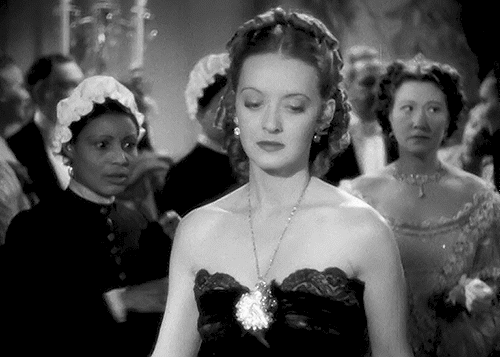
#jezebel#jezebel 1938#owen davis#william wyler#bette davis#john huston#old south#yellow jack epidemic 1853#julie marsden#henry fonda#fay bainter#george brent#richard cromwell#margaret lindsay#donald crisp#theresa harris#stymie beard#spring byington#henry o'neill#margaret early#lew payton#eddie anderson#gwtw#period drama#old hollywood#costume drama
3 notes
·
View notes